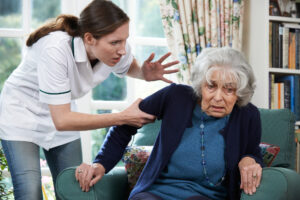Posted in Nursing Home Abuse on January 13, 2023
Did you know that 40% of American nursing home residents have reported abuse?
Nursing home neglect and abuse is a serious problem. Vulnerable older people are being harmed by the very people we trust to look after them. If you’ve witnessed signs of abuse in a nursing home, you should act now and protect your loved ones.
But how do you tell when somebody’s at risk, and what can you do to help them? We’ve put together this helpful guide with resources that explain everything you need to know.
Keep reading to find out how a nursing home abuse attorney can help.
What is Nursing Home Abuse?
Nursing home and elder abuse occur when a caregiver or any other person knowingly or negligently causes harm or serious risk to a vulnerable older person.
Abuse can happen for several reasons. However, there is no excuse for compromised patient care in nursing homes. Elder abuse leads to serious emotional harm, physical injuries, and even premature death.
Often, abuse victims don’t speak up because they feel scared and intimidated. This under-reporting can create a culture of abuse in the industry and cause last patterns of harm.
Types of Nursing Home Abuse
Nursing home abuse can take many forms. Let’s take a look at some of the most common types of nursing home neglect and abuse:
Physical Abuse
Physical abuse happens when a patient suffers unnecessary pain or discomfort. It includes any treatment that keeps patients from having their basic physical needs fulfilled, including food, shelter, warmth, and dignity.
Active abuse is when a carer inflicts direct violence on a resident. This could mean hitting, slapping, kicking, or any other rough treatment. Physical neglect is equally harmful and occurs when the patient’s needs are deliberately withheld or unfulfilled.
Care home staff are trained to only use body restraints when absolutely necessary. Misusing or overusing restraints is another form of physical abuse.
Emotional Abuse
As well as physical care, nursing homes are obligated to provide emotional support to their residents. Emotional neglect and abuse have serious consequences for older victims because it undermines their confidence and daily quality of life.
Emotional abuse could include name-calling, yelling, deliberate ignorance, threats, or harassment.
Neglect
Abuse can be defined by actions but also by inaction. Neglect is a leading cause of elder abuse in nursing homes.
General and medical elder abuse can lead to:
- Bedsores and infections
- MRSA
- Sepsis
- Dehydration and malnutrition
- Problems with choking and swallowing
- Blocked breathing tubes
Each of these factors- alone or in combination- have serious impacts on the quality of life and life expectancy for vulnerable patients. While neglect is usually unintentional, it can be just as harmful as active abuse.
Sexual Abuse
Sadly, sexual abuse is a common type of elder abuse. It includes any form of unwanted sexual contact from carers, residents, or anybody else.
Bruising around the genitals and unexplained sexually transmitted infections are indicators of sexual abuse.
Financial Abuse
Older people often fall victim to unscrupulous scammers. We trust caregivers to protect our loved ones from people who want to exploit them financially.
However, in many cases, the caregivers are actually the ones who are perpetrating the fraud. Some financial abuse is very sophisticated and involves a long grooming process, during which the abuser uses manipulative tactics to win the victim’s trust.
Signs of Elder Abuse
One of the most insidious parts of elder abuse is that victims often feel helpless to raise the alarm. They might feel intimidated by their abuser, confused by the situation, or unable to communicate the problem.
Check in with your elderly relatives often and keep an eye out for these signs of abuse:
- Cuts and bruises
- Scrapes and abrasions
- Burns
- Tears and bruising around the genital area
- New or unexplained sexually transmitted infections
- Marked changes in mood
- Unusual sleeping habits
- Increased anxiety and fear
- Unpaid bills
- Unexplained bank withdrawals
- Rapid weight loss
If you notice any of these signs, somebody could be abusing your elderly loved one. Look here for a full list of abuse indicators.
Why Does Nursing Home Abuse Happen?
Several factors contribute to nursing home harm and abuse. At its core, the issue tends to rest on poor training, high staff turnover, and understaffing problems.
Some facilities have outdated equipment and training procedures, increasing the likelihood of unintentional neglect and lapses in patient care. Stressful and understaffed working environments can lead to careers cutting corners when it matters.
There’s never an excuse for elder abuse. If you have concerns about a nursing home facility, report them here.
How a Nursing Home Abuse Attorney Can Help
Elder abuse is a serious crime. If your loved one is a victim, a nursing home abuse attorney can help get them the justice they deserve.
Our specialist elder abuse lawyers have years of experience prosecuting those who abuse the vulnerable. They will work tirelessly to verify your loved one’s claims, negotiate with the negligent party, and endure that victim receives any compensation they’re owed.
We’ll help you navigate this tragic situation and protect the victim from further nursing home harm. We coordinate with a network of experts and professionals to support you and your family at every stage of the case.
Understanding Elder Abuse in Nursing Homes
Finding out that your elderly loved one is being abused is a heartwrenching experience that nobody should ever have to go through.
However, the sad reality is that elder abuse is all too common in nursing homes. We hope this guide helps you identify and intervene on all forms of elder abuse.
If you need legal help, our nursing home abuse attorneys are on hand to support you through the entire process. Follow the link to contact us now.



